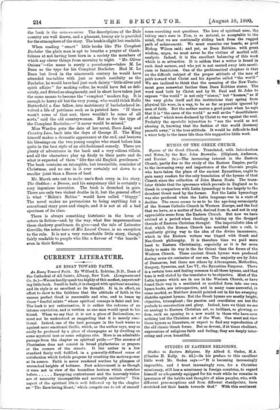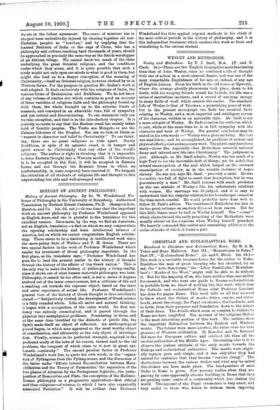STUDIES IN EASTERN RELIGIONS.
Studies in Eastern Religions. By Alfred S. Geden, M.A. (Charles H. Kelly. 3s. 6d.)—In his preface to this excellent little work Mr. Geden says :—"It is becoming increasingly impossible, and I trust increasingly rare, for a Christian missionary, still less a missionary in foreign countries, to regard himself as adequately equipped for his work while he remains in ignorance of the habits and thoughts of alien peoples, who, with different preconceptions and from different standpoints, have stretched out their hands towards God." With this sentiment
we are in the fullest agreement. The cause of missions has in the past been undoubtedly injured by classing together all non- Christian peoples as "heathen," and by implying that the learned Brahmin of India or the sage of China, who has a philosophy and culture reaching back thousands of years, should be approached in precisely the same way as the fetich-worshipper of an African village. We cannot know too much of the ideas underlying the great Oriental religions, and the conditions under which they arose, and it is quite possible that such a study might not only open our minds to what is good in them, but might also lead us to a deeper conception of the meaning of Christianity,—itself an Oriental religion, however clothed by us in Western forms. For the purpose in question Mr. Geden's work is well adapted. It deals exclusively with the religions of India, the various forms of Brahminism and Buddhism. We do not know of any volume of similes. size which contains so good an account of these varieties of religious faith and the philosophy bound up with them, the whole brought up to the extreme limits of research, and conveyed in an admirable tone, full of sympathy and yet critical and discriminating. To one statement only can we take exception, and that is in the introductory chapter. It is scarcely accurate to say that the Moslem creed has mainly taken hold of Semitic peoples. The Turks are Mongols, so are the Chinese followers of the Prophet. Nor can we look on Islam as "nearest in character and belief to Christianity." To our think- ing, there are no great religions so wide apart. Surely Buddhism, in spite of its agnostic creed, is in temper and spirit nearer to Christianity than any other of the world's religions. The author is right in thinking that it is impossible to force Eastern thought into a Western mould. If Christianity is to be accepted in the East, it will be accepted in Eastern forms, and not through the Romanic forms in which we (unfortunately, in some respects) have received it. We bespeak the attention of all students of religious life and thought to this unpretending but able and well-arranged work.



































 Previous page
Previous page